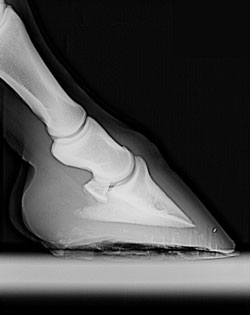 Vet check
Vet check
![]() RSS-Feed of the Advisor
RSS-Feed of the Advisor
Subscribe for Free!
When buying a horse, you should pay special attention to a few things. One important point is a vet check.
What is a vet check and when should it be carried out?
Through a vet check, an equine veterinary assesses the health of your horse. A vet check should always be carried out before buying/selling a horse.
There are two different types of vet checks – the clinical and the radiographical check.
The clinical vet check
With a clinical vet check, the veterinary assesses mainly the general state of health of the horse. In addition, he/she checks the pulse and breathing rate, the condition of the heart and the lungs and inspects the horse’s skin, its coat and its teeth.
These checks will first be carried out while the horse is rested, either in its box or in the stable aisle, as well as after the horse has been physically active. Thereby the vet can assess how quickly the horse regenerates.
An important aspect of the vet check is also the inspection of the horses’ extremities and its back. This is first done through palpating, before the horse is walked around on solid ground, first in straight lines, then in small turns. Thereby the vet can detect any possible lameness.
An important component of the clinical vet check is inspecting the flexibility of the horse’s legs. This check allows the vet to see whether the horse will respond to such a check with lameness. If this is the case, a radiogram can be taken to investigate the causes.
The radiographical vet check
With a radiographical check, the diagnostic findings are based on usually ten radiograms, which are taken of the ankle joints, the fetlocks and the hooves. If requested, further radiograms can be taken of other skeletal features of the horse, for example the back. The findings of these radiograms are grouped in four different categories.
In addition, special examinations can be included in the radiographical check, such as an endoscopy, ultrasounds, a blood count etc.
More information on examination techniques can be found via Horse & Hound.
The vet check – which aspects should I pay attention to?
Are you looking for a horse for competing or for leisure riding?
Think about the kind of horse that you are looking for. A sport horse should be in excellent physical shape, as it will be exercising heavily. However, when buying a horse for leisure riding, minor physical defects can well be accepted.
Which vet is right for you?
Choose a vet whom you trust. If possible, try to be present at the vet check, so that you can discuss the findings with the vet. If the vet check is not carried out by your regular vet, it is advisable to send the diagnostic findings to your regular vet who knows your horse better, so that he/she can assess the results from his/her view point.
How much does a vet check cost and who should pay?
Talk to your vet in advance about what the check will entail. This will allow for a realistic estimate of costs. The price of the vet check can vary, depending on the extent of the check and where you live. The small vet check usually costs between 100€ and 250€, the large vet check can cost up to 1,600€.
Who pays for the vet check needs to be decided. Often, the side who commissions the check pays, which is usually the potential buyer.


